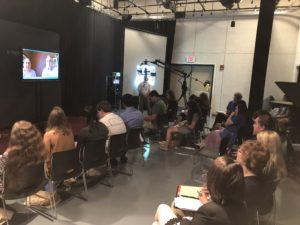Speakers agree, creativity essential to future of journalism

Students Skyping with Dwinell and Sciacca
by Evelyn Cutting
Three speakers stressed the importance of creativity in modern journalism on the first day of the Presidency and the Press.
On Monday morning, Stephen Keimig, Joseph Sciacca, and Joe Dwinell spoke with fourteen students, briefing them about the program and topics they would be discussing during the following week. Keimig is a writer for Fox News, Sciacca is Editor-in-Chief for the Boston Herald, and Joe Dwinell is Director of Investigative and Special Projects for the Herald.
Keimig said that it’s critical to be creative not only in shots and angles, but in how you report and what you report on. You need to get the attention of your audience and the best way to do that is with an innovative approach.
Joe Dwinell said, “[Reporters] have got to think outside of the box and ask ourselves, what are people looking for?”
Referencing the book The Innovator’s Dilemma by Clayton Christensen, Dwinell and Sciacca agreed that the “disruptive innovation” caused by advances in communication will call for changes in how we get our audiences to read. But journalism has found ways around many obstacles in the past. “You are the most informed generation…you are curious and have many resources at your fingertips,” says Sciacca.
In this day and age, innovative approaches require finding a new way to get stories to audiences. It is the most sought after fix concerning creativity in journalism, according to Sciacca and Dwinell. Whether it’s a change in the way we present media or a change to the system, Sciacca is positive that “Journalism cannot die. We need to figure it out.”
Creativity will become the biggest factor in what news companies survive these modern struggles. Whoever can find the newest, easiest, quickest way to get news to audiences will come out on top. All the speakers today have assured the students that their generation is the future of journalism.

Socialize